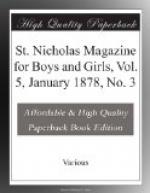Perhaps you will like best to hear that many of you often stand where Irving stood, and walk the streets he knew so well, for New York City was Irving’s birthplace, and there many of the seventy-six years of his life were spent. One of his books is a funny description of his native town in the days of its old Dutch governors. He does not call it Irving’s, but “Knickerbocker’s History of New York.” And as only Irving knew anything of Diedrich Knickerbocker outside this book, we will let him tell you that “the old gentleman died shortly after the publication of his work.” Of course, Irving can say what he chooses about Knickerbocker’s book, so he gives it as his opinion that, “To tell the truth, it is not a whit better than it should be.” But Sir Walter Scott, in a letter to a friend, says of these funny papers of Irving’s: “I have been employed these few evenings in reading them aloud to Mrs. S. and two ladies who are our guests, and our sides have been absolutely sore with laughing.” All Irving’s histories are not “make-believe,” and some day you will read Irving’s “Life of Columbus,” and “Life of Washington,” completed just before his death in 1859, without thinking of them as histories. He wrote the “Life of Columbus” in Spain. Can you tell me why that was the best place to write it?
Would you like to know where the boy Irving might often have been seen when he was not devouring the contents of some book of travels? “How wistfully,” he wrote, “would I wander about the pier-heads in fine weather? and watch the parting ships, bound to distant climes!”
Not many years after, he wrote from England, “I saw the last blue line of my native land fade away like a cloud in the horizon.” He was then in England, where he visited Westminster Abbey, Stratford-on-Avon, and many other grand and famous places. Of these, and much that is neither grand nor famous, he has written in the “Sketch-book,” giving this reason for so naming word-paintings: “As it is the fashion for modern tourists to travel pencil in hand and bring home their portfolios filled with sketches, I am disposed to get up a few for the entertainment of my friends.” Is it not as good as a picture to hear this man, who had no little ones of his own, tell of “three fine, rosy-cheeked boys,” who chanced to be his companions in a stage-coach? This is what he writes:
“They were returning home for the holidays in high glee and promising themselves a world of enjoyment. It was delightful to hear the gigantic plans of the little rogues. * * * They were full of anticipations of the meeting with the family and household, down to the very cat and dog, and of the joy they were to give their little sisters by the presents with which their pockets were crammed; but the meeting to which they seemed to look forward with the greatest impatience was with Bantam, which I found to be a pony.” When he had heard what a remarkable animal this pony was said to be, Irving gave his attention to other things until he heard a shout from the little travelers. Let him tell the rest of the story.




